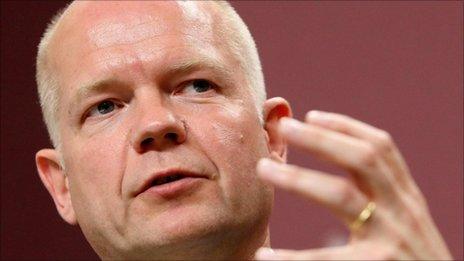EU referendum: Tensions ahead of MPs' vote on Monday
- Published
- comments
Defence Secretary Philip Hammond confirms Conservative MPs will be told to vote against Monday's motion for a referendum on EU membership.
The war of words has intensified ahead of Monday's House of Commons vote on whether to hold a referendum on UK membership of the European Union.
About 70 Tory MPs may defy orders and vote for it; one, John Redwood, urged a rethink of the planned three-line whip.
But Defence Secretary Philip Hammond ruled out a change of Tory stance.
Labour leader Ed Miliband meanwhile, told the BBC's Politics Show that David Cameron had brought the problems on himself by "appeasing eurosceptics".
"It's no wonder that his backbenchers are disappointed, because he has been pretending for a long time that he is one of them," he said.
Defence Secretary Philip Hammond had earlier confirmed that Conservative MPs would face a three-line whip - the strongest order a party can give its MPs - to vote on Monday against the motion calling for a referendum to be held on the UK and the EU.
Mr Hammond told the BBC's Andrew Marr Show that despite unhappiness amongst some Tory backbenchers and the threat of some frontbench resignations, "the three-line whip remains because the motion is contrary to government policy".
Prominent Conservative backbencher John Redwood said there was no need for a three-line whip because Labour and Lib Dem MPs were going to vote against the motion.
He urged the government to downgrade the orders to a one-line whip.
He said that the debate had been prompted by a petition signed by more than 100,000 people, and said he thought MPs should be able to reflect the views of their constituents.
A one-line whip is effectively a guide to MPs about how the party leadership would like to see them vote - a three-line whip is the strictest instruction, with anyone defying it expected to have to resign from government jobs.
Speaking after emergency talks with European leaders in Brussels on the eurozone crisis, Prime Minister David Cameron reiterated his view that it was not the "right time" to legislate for an in-out referendum.
But he said the possibility of changes to the European Union's treaty had been discussed at the summit - and that could provide an opportunity for Britain to reclaim powers from Brussels.
"I think this is the right time to sort out Europe's problems, sort out the eurozone problem, defend your national interest, and look to the opportunities there may be in the future to repatriate powers back to Britain - and obviously the idea of some limited treaty change in the future might give us that opportunity," he told a news conference.
Asked whether raising the possibility of repatriating some of Britain's powers was an olive branch to Tory rebels, Mr Cameron said: "You can interpret it how you want to."
On Saturday Foreign Secretary William Hague, widely seen as a eurosceptic, urged Tory MPs not to vote for the motion. Writing in the Daily Telegraph,, external he said solving the eurozone finance crisis should be the priority.
By May 2013
The former Lib Dem leader Charles Kennedy, a euro-enthusiast, told BBC Radio 4's The World This Weekend he thought a referendum "will have to come eventually to lance this boil for another generation in British politics, irrespective of your party allegiance".
But he added: "Tomorrow is not the time and this will not prove to be the event that delivers it."
The motion calls for a referendum by May 2013 and says the public should have three options put to them in the nationwide vote - keeping the status quo, leaving the EU or reforming the terms of the UK's membership of the EU.
A large number of MPs are expected to back the proposal, which was put forward by Tory David Nuttall, although a vote in favour would not be binding on the government.
In the coalition agreement, external, the Conservatives and the Lib Dems, a traditionally pro-European party, agreed to "ensure that the British government is a positive participant in the European Union, playing a strong and positive role with our partners".
On Friday, Deputy Prime Minister Nick Clegg said it was the worst time for a debate about Britain leaving the EU as a "firestorm" engulfs the eurozone.
- Published24 October 2011
- Published23 October 2011
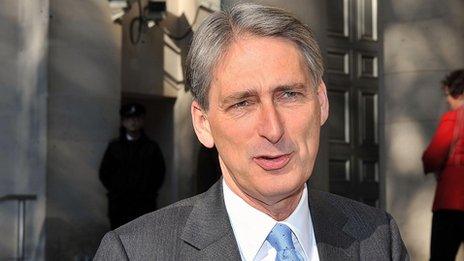
- Published20 October 2011
- Published21 May 2015
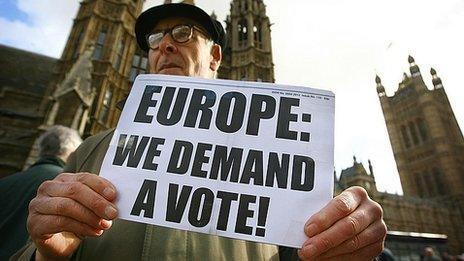
- Published21 October 2011
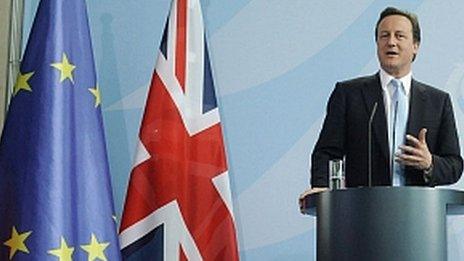
- Published19 October 2011
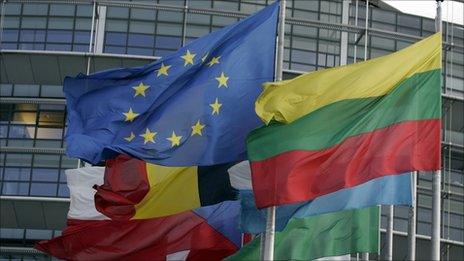
- Published18 October 2011
- Published5 October 2011
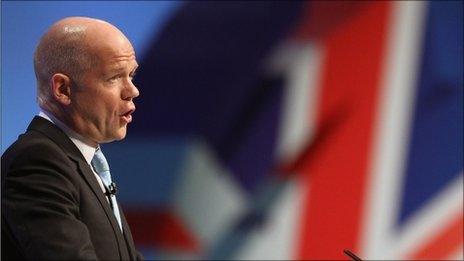
- Published10 September 2011
